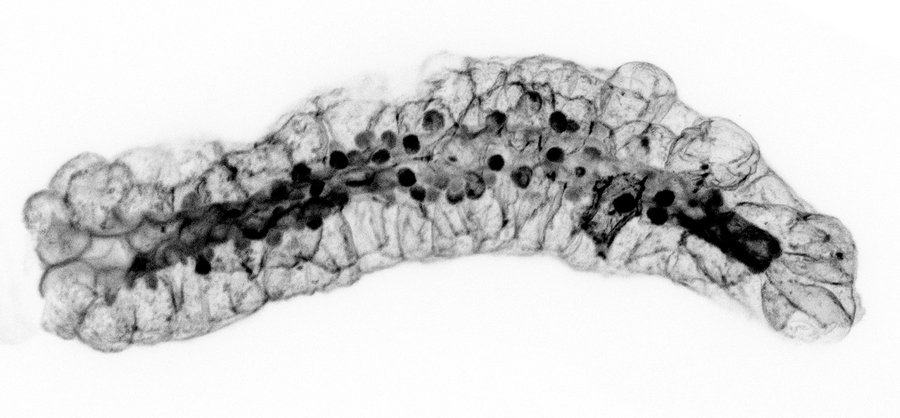
Salivary gland, deficient in Crumbs protein, showing aberrant lipid accumulations. © Lattner et al.
A trouble-free transport mechanism within membranes is essential for the function of polarized epithelial cells. Defects in membrane transport are associated with a variety of diseases, including immune syndromes, deafness, neuronal degeneration and cancer. A group of researchers from the Biotechnology Center of the TU Dresden (BIOTEC) and the MPI-CBG in Dresden, have therefore studied how polarity proteins regulate intracellular membrane trafficking.
Using the salivary gland of Drosophila larvae, they showed that the key polarity protein Crumbs organizes the apical membrane trafficking machinery. The results indicate that Crumbs is essential for membrane homeostasis, the physiological function of a secretory gland and the development of the larvae by affecting the feeding behaviour of the animals. Although Crumbs is already a known key determinant of the apical plasma membrane, very little is known about the mechanism behind it. This work provides a molecular mechanism that explains how Crumbs controls apical membrane organization and identity.
The study provides an attractive experimental model to analyse the molecular mechanisms behind the maintenance of polarized membranes in vivo. This can also be useful to understand how cells control the transport and delivery of certain cargoes under physiological and pathological conditions. For example, the results suggest that Crumbs and the lipid regulator Pten may be involved in Microvillus Inclusion Disease (MVID), a fatal genetic disease characterized by the lack of microvilli on the surface of enterocytes. Interesting follow-up research would be whether the molecular mechanism described here is also relevant in the clinical picture of human diseases like retinal degeneration associated with mutations in the human gene CRUMBS1, which is estimated to affect 80,000 people worldwide.

Johanna Lattner, Weihua Leng, Elisabeth Knust, Marko Brankatschk, David Flores-Benitez: "Crumbs organizes the transport machinery by regulating apical levels of PI(4,5)P2 in Drosophila". eLife, 7. November, 2019. DOI: 10.7554/eLife.50900